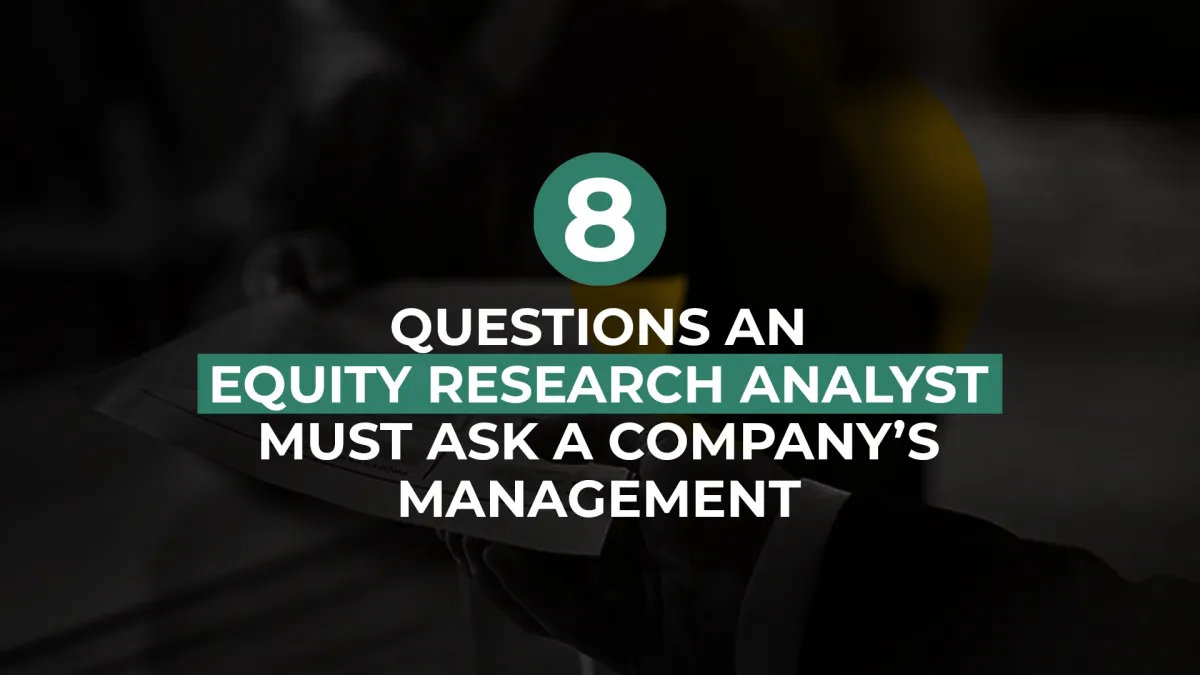In events like investors conference, earnings release call and analyst meets, the Equity Research Analyst gets an opportunity to interact with the Senior Management of the company, and he should make the most of it. Questioning the management to extract useful information about the company is an art. It’s not as easy as it sounds. Most of the times, the management will only like to talk about the positives and downplay the challenges. However, an equity research analyst has to see the holistic picture for stock research. Hence, the questions need to be framed very smartly.
Below are 8 most important questions that an Equity Analyst must ask the management:
- How do you plan to use the cash balance?
Residual cash balance is an important indicator of the health of the company. When questioned on how the company plans to use its cash, the management may give a few pointers. There will be indications as to whether they are looking at merger & acquisition, share buy-back or reinvesting the cash for future prospects. The answer will throw light on various factors that could impact the stock movement.
If you specifically ask about growth prospects, the company should answer as to how it is going to improve its market position and increase its cash balance. Any answer which says otherwise would raise questions on the expansion plan of the company.
- What do you like most in your competitor/competitors?
It takes great deal of honestly and courage to admit that your competitors are equally good as you or even better. This question helps an analyst to understand how aware the management is about its competitors. Being fully mindful about their strengths indicates that the company might also adopt similar strategies in future. The company may get inspired and choose to launch a similar product/service, foray into a similar market or go for a marketing plan on the lines of its competitor. This question helps an analyst to predict the next move of the company.
- What are you doing that your competitors aren’t doing yet?
Company should be aware of its strengths and the way it has gone ahead of one of its competitors. The Equity Analyst needs to judge whether the company still has unique plans and thinks ahead of its peers. At the same time, the company needs to be on guard that a rival company could get inspired and create a product/service which can become its serious competitor. The answer to this question shows how well prepared a company is to face upcoming competition.
- How did you plan to enhance your USP?
Every company has its unique selling proposition (USP) and investors want to know how it is planning to enhance it. If the company is a forerunner in selling luxury products, investors will want to know whether it is planning to add more exclusive offerings to its product line. If the company specializes in manufacturing low cost electric components, investors would want to know if it there capital expenditure incurred on an advanced technology used to increase production. When asked this question, the management should give concrete answers as to what steps it is taking to deepen its area of specialization.
- What is your philosophy on Mergers & acquisitions (M&A)?
Mergers and acquisitions is a crucial event for a company. With respect to the sector that the company belongs to, an Equity Analyst can ask the management about his views on M&A, its readiness for consolidation, its criterion to target companies, capability of execution team for M&A, etc. The answers will help an analyst to deduce whether the company can hold its position in the market on its own or does it want to grow through the inorganic way.
- How do you plan to tackle the current wave of technology disruption?
Technology disruption is the biggest truth today and companies have to prepare themselves for it. When analysing a company prone to technology disruption, the management needs to be asked whether it is aware of these changes. Technology disruption has a short-term negative and long-term positive impact in most cases. The management should be able to answer how it is going to hedge itself against the near-term losses and capitalize the gains in future. The analyst also needs to judge how optimistic and well prepared the company is to adopt new technologies.
- What is the company’s viewpoint on dividend and buyback policies?
An Equity Analyst must know if the capital allocation in the company is following an optimal mix. If the company wants to buy back, the analyst can ask the management to throw light on its motive behind the buyback. As for dividend, the analyst needs to see whether the company is following a dividend policy in tune with its nature and performance.
- What are the lesser known factors that can impact the stock going forward?
This is a very direct question, wherein the analyst would like to know about every other factor that can impact the performance of the stock going forward. There are factors only the management of the company can throw light upon, which the analyst would otherwise miss out. The analyst can articulate the question and get information on such lesser known facts. This could be anything ranging from economy, technology, sector, product or company specific factors.
Conclusion
This is an indicative list. There can be many questions other than this that the equity analyst might want to ask the management. Before asking the questions, the Equity Analyst needs to do his homework well. Also, it’s not just the questions, but the answers given by management must be analysed with a broad mind.








Leave A Comment